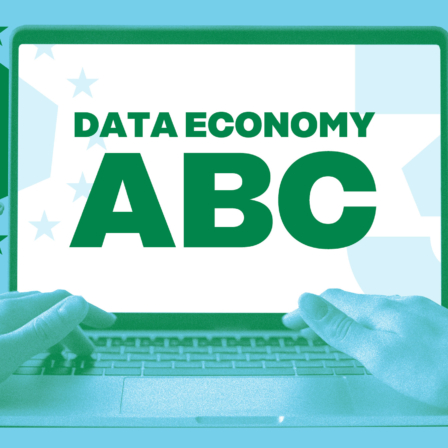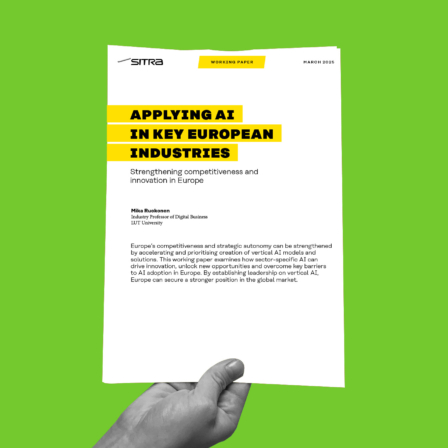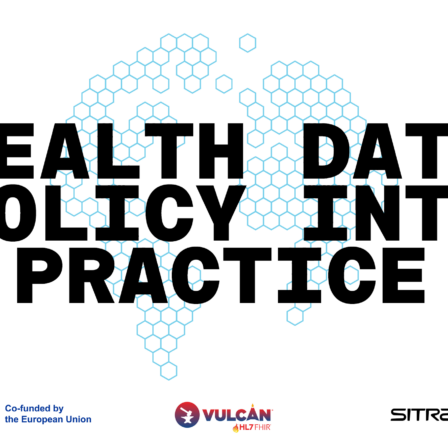Background
The Finnish Innovation Fund Sitra has participated in the public consultation and issued a statement on the government’s decision-in-principle on entrepreneurship (VN/27217/2021, in Finnish).
The government’s decision-in-principle on entrepreneurship is based on the entrepreneurship strategy prepared in accordance with the Government Programme. The decision-in-principle is in effect from 2022 to 2027.
The purpose of the government’s decision-in-principle on entrepreneurship is to provide guidelines on goals and measures to develop the entrepreneurial environment in a cross-sectoral and long-term manner.
Sitra’s observations
Sitra is grateful for the opportunity to respond to the request for a statement. Sitra has provided the following responses in the public consultation.
1. Does the decision-in-principle on entrepreneurship take into account the key issues from the point of view of promoting entrepreneurship?
No. Sitra emphasises three themes in particular in the decision-in-principle: the swift and fair promotion of the digital and green twin transition, supporting SMEs and start-ups, and investing in innovation.
2. What should be particularly taken into account in implementing the decision-in-principle on entrepreneurship?
In terms of Finland’s competitiveness, digital and green twin transition and a fair distribution of prosperity, it is essential to support Finland’s numerous SMEs and nurture their willingness and capability to grow in the changing operating environment. In planning the measures, it is essential to consider the digital and green twin transition and the potential for businesses to seize its many opportunities, which should be reflected in the proposed goals, ministries’ actions and follow-up.
Sitra supports measure III.3 to “strengthen the skills and resources of SME entrepreneurs to grow sustainably and innovate by consistently increasing SMEs’ digital and data capability to ensure the full use of digitalisation and data.” According to a study by Sitra, SMEs in particular have difficulties in entering the winning circle of the data economy (Sitra 2021, European companies have difficulties in getting aboard data economy). Promoting data sharing between organisations in ecosystems is particularly important for boosting productivity, but companies lack the trust needed to share data and the skills to adapt their business models.
The global data market offers growth prospects for Finnish SMEs, which play an important role in developing services by virtue of their sheer agility in terms of aggregate volume and small size (European Commission, The European Data Market Monitoring Tool).
Finland has excellent digital capabilities (ETLA Economic Research 2021, Digibarometer, in Finnish; European Commission 2021, Digital Economy and Society Index (DESI), but these do not directly translate into data economy successes or increased value in the data market. While Sweden and the Netherlands are projected to double the value of their data markets to EUR 7–8 billion by 2025, the projection for Finland remains below EUR 1.5 billion.
Much EU regulation affecting the data economy and businesses is expected. Sitra supports measure III.1.5 to “take into consideration the special characteristics of SMEs in, for example, influencing EU regulation so that SMEs’ administrative burden will not increase due to unnecessary strain.” According to Sitra’s study, businesses companies perceive legislative complexity as the biggest challenge in the data economy (30% of respondents in Finland, the Netherlands, France and Germany) (Sitra 2021, European companies have difficulties in getting aboard data economy).
SMEs in particular should be offered help in navigating regulations and identifying opportunities both in Finland and in the European single market. Efforts are also needed to streamline administration.
The decision-in-principle should also take into account attitudes and foresight and insight. According to Sitra, in addition to skilled employees, companies need skilled and change-positive management (Sitra 2021, Datan hyödyntäminen pk-yrityksissä edellyttää johdolta oivalluskykyä, in Finnish). In particular, companies need to understand whether data-related co-operation with others can generate new business and innovative services and open up new markets.
Foresight and insight needs to be backed up by bold future-oriented thinking – we will not achieve the change we want just by looking in the rearview mirror while staying in our own lane. Sitra encourages mapping what Finland’s peers are doing to promote entrepreneurship and raise awareness of best practices.
Funding must take into account EU funding and raising companies’ awareness of opportunities.
3. Are the measures in the decision-in-principle on entrepreneurship sufficient to secure cross-sectoral collaboration and coordination(action 6.1.)?
Yes.
4. Are the proposed follow-up indicators comprehensive for monitoring the decision-in-principle on entrepreneurship (section IV)?
The follow-up indicators lack the development of companies’ digital and data capabilities. It is important to acknowledge this from the point of view of the realisation of both the goals and actions (for example digital and green transition) and the development of further measures. In this respect, measurement could to some extent be combined with the EU’s Digital Compass goals and annual reporting.
Concerning internationalisation, Finnish companies’ position in the data market must be taken into account.
5. How can cross-sectoral co-operation between ministries be developed to implement the decision-in-principle on entrepreneurship?
Sitra encourages synergy with the ministries’ digital office, especially concerning the situation awareness process and Digital Compass work, one of the four priorities of which focuses on the digital transformation of businesses. In addition, the other priorities support the goals set for companies. For example, infrastructure development should focus on “soft digital infrastructure” to support data sharing and mobility between companies and operators.
6. Other possible comments on the decision-in-principle on entrepreneurship.
With the platform economy and transformation of work, operating solely on third-party platforms may become a more common way of doing business. An entrepreneur operating on the platforms may not necessary be seen as a business in the traditional sense or even establish a conventional business structure as the basis of operations.
In the future, a significant share of business model innovations may, however, be created by these new kinds of entrepreneurs, who are agile in their use of platform data and direct access to international consumer markets.
Supporting these new kinds of entrepreneurs and anticipating innovative future business models in the entrepreneurship strategy would be a good way of ensuring its future-proofing.
Further information
Public consultation in the consultation service (in Finnish)



















Recommended
Have some more.